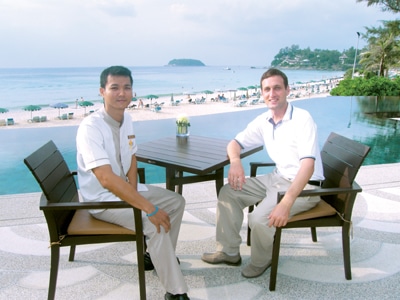Phuket Lifestyle: No reservations – the life of a hotel English teacher

PHUKET: Tucked away on the idyllic white sand beach of Kata Noi, a very chilled out and softly-spoken Jacob Ritter works as a communications specialist and English teacher for the Katathani Beach Resort.
Flanked by palm trees and with an ocean sunset behind him, Ritter sat down with the Gazette to share his insights into the luxurious life of a hotel English teacher.
So Jacob, what were you doing prior to working for the Katathani?
I taught physical education at a private school in Bangkok for awhile. Then I moved back to Phuket to teach English, tai chi and yoga at Phuket’s largest university; I’ve also done some holistic training at local health resorts.
How did you find the job?
Actually, my girlfriend found it for me on a Thai-language website called phuketall.com.
Describe your average day.
In the low season I do a lot of teaching – usually six hours a day because that’s when the staff has time for English lessons. In the high season, there’s less teaching and I have more communications work such as writing executive managers’ emails and marketing materials. Specifically, I do public relations work for the hotel’s environmental projects, of which there are many.
How do you set up your classes?
Classes are set up by department because language levels are often similar within each department. We try to see each class for 8-10 hours each week. I write most of the lessons, but department heads will also have some requests to suit each department’s special needs. I work six days a week — five are for class time and one is for lesson planning.
Does the hotel supply you with teaching resources?
Yes, we have employee manuals that the hotel owner designed. In addition to these, I’ve added a lot of my own materials, as well as some materials from past teachers.
What is the most important aspect of language learning for your hotel’s staff?
Listening. If they can’t listen and understand the guest, then there’s going to be a problem.
What is your approach to teaching Thai students?
I try to maintain a relaxed and light-hearted atmosphere in class. Lessons shouldn’t be a chore, so English becomes something fun for students and they have a positive experience. When you’re too serious, it can turn off the flow of learning.
Do you have any discipline problems?
I haven’t really had any problems. My students have to approach this like a job; no one wants to cause problems.
Is the job what you expected it to be when you got hired?
It’s a bit more dynamic. It demands certain things of me beyond teaching English so I’m learning a lot too. I do more than I thought I would and that’s been a pleasant surprise.
What is the most difficult aspect of your job?
The cultural differences can be challenging and standard expectations for employees are different from those in my home country. Yet other cultural differences also help to create the best aspect of my job. We are here in a Thai beach resort and everything is quite easygoing so I can’t complain.
What’s one thing about your job that you would change?
My six-day work week. In my opinion, the long work week can affect overall performance.
What are some of the perks of working for a luxury resort?
I get to attend cocktail parties with hotel guests; I have accommodation in a manager’s suite on the beach and utilities are paid for. Also, housekeeping, laundry, meals, hotel discounts and use of hotel facilities are all included in my salary package.
What should someone seeking a position like yours expect in terms of salary?
At least 30-35 thousand baht a month, plus the perks I mentioned before. Without the benefits and perks, at least 45 thousand, but I know of some hotels here offering less.
— Eric Haeg
Latest Thailand News
Follow The Thaiger on Google News:


























